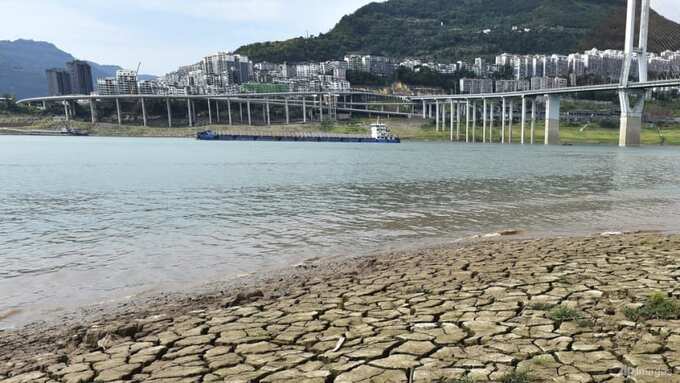May 24, 2025 | 16:27 GMT +7
May 24, 2025 | 16:27 GMT +7
Hotline: 0913.378.918
May 24, 2025 | 16:27 GMT +7
Hotline: 0913.378.918

A dried riverbed is exposed after the water level dropped in the Yangtze River in Yunyang county in southwest China's Chongqing Municipality on Aug 16, 2022. Photo: Chinatopix
...as local governments race to find new supply sources and irrigate crops ahead of the autumn harvest.
A severe heatwave across the basin of China's longest river, caused by a larger than usual Western Pacific subtropical high, has now lasted more than two months, slashing hydropower supplies and drying out large expanses of arable land.
Normal water flows could still be months away, with rainfall expected to remain low until the end of this month and beyond, said Liu Zhiyu, an official at the Ministry of Water Resources, speaking at briefing late on Wednesday (Aug 17).
"It is expected that in September, water inflows in the middle and lower reaches of the Yangtze will still be low, and the drought in Anhui, Hubei, Hunan and Jiangxi could develop further," Liu warned, referring to four major provinces on the middle reaches of the river.
Rainfall in the Yangtze basin has been around 45 per cent lower than normal since July, and high temperatures are likely to persist for at least another week, according to official forecasts.
Authorities in the region also warned that temperatures would continue to exceed 40 degrees Celsius on Thursday, with parts of Chongqing set to go beyond 44 degrees Celsius, putting further pressure on power supplies amid surging air conditioner use.
Water levels on the main trunk of the Yangtze and the vital flood basin lakes of Dongting and Poyang are now at least 4.85m shallower than normal, and the lowest on record for the period, officials said.
Rice and other autumn crops were now at a "critical period" when it comes to irrigation, warned Liu Weiping, Vice-Minister of Water Resources, at the same Wednesday briefing.
He said around 820,000 ha of arable land from Sichuan in the southwest to central China's Anhui have suffered damage, affecting 830,000 people as well as 160,000 head of livestock, mostly in areas relying on smaller reservoirs or mountain springs for irrigation.
Upstream reservoirs have opened their gates to replenish storage levels at the Three Gorges Dam, which will release 830 million cubic metres downstream over the coming days, Liu said.
Local governments are also being urged to ensure that enough water resources are stored for emergency use, and to make use of additional water sources, including mountain springs and streams, he said.
COMBATTING DROUGHT
In an effort to bring relief to the drought-hit Yangtze river basin, China is taking emergency action to bring more water to the area.
It is deploying relief funds, seeding clouds and developing new supply sources as the record-breaking heat damages crops and livestock.
The Ministry of Water Resources said in a notice on Wednesday that drought throughout the Yangtze river basin was "adversely affecting drinking water security of rural people and livestock, and the growth of crops".
It urged regions to make accurate assessments of drought-affected areas and devise plans to maintain water supplies, including through temporary water transfers, the development of new sources and the extension of pipe networks.
To boost downstream supplies, the Three Gorges Dam, China's biggest hydropower project, will also increase water discharges by 500 million cubic metres over the next 10 days, it said on Tuesday.
Some livestock from drought-hit areas had been temporarily relocated to other regions, the Ministry of Finance said earlier this week, adding that it would issue 300 million yuan (US$44.30 million) in disaster relief.
On Wednesday, central China's Hubei province became the latest to announce an extensive weather modification programme, deploying planes to fire silver iodide rods into the clouds to induce rainfall.
Other regions on the Yangtze have also launched "cloud seeding" programmes, but with cloud cover too thin, operations in some drought-ravaged parts of the Yangtze basin have remained on standby.
China's heatwave has now lasted 64 days, making it the longest since full records began in 1961, state media said on Wednesday, citing data from the National Climate Center.
The number of weather stations recording temperatures of 40 degrees Celsius and above has reached 262, also the highest. Eight have hit 44 degrees Celsius.
Persistently high temperatures would continue in the Sichuan Basin and large parts of central China until Aug 26, the centre forecast.
A "special case" of high pressure from the West Pacific subtropical high, stretching across much of Asia, is likely to be the cause of the extreme heat, said Cai Wenju, climate researcher with CSIRO, Australia's national scientific research institute.
(Reuters)

(VAN) Alt Carbon has raised $12 million in a seed round as it plans to scale its carbon dioxide removal work in the South Asian nation.

(VAN) Attempts to bring down the price of the Japanese staple have had little effect amid a cost-of-living crisis.

(VAN) Fourth most important food crop in peril as Latin America and Caribbean suffer from slow-onset climate disaster.

(VAN) Shifting market dynamics and the noise around new legislation has propelled Trouw Nutrition’s research around early life nutrition in poultry. Today, it continues to be a key area of research.

(VAN) India is concerned about its food security and the livelihoods of its farmers if more US food imports are allowed.

(VAN) FAO's Director-General emphasises the need to work together to transform agrifood systems.

(VAN) Europe is facing its worst outbreak of foot-and-mouth since the start of the century.